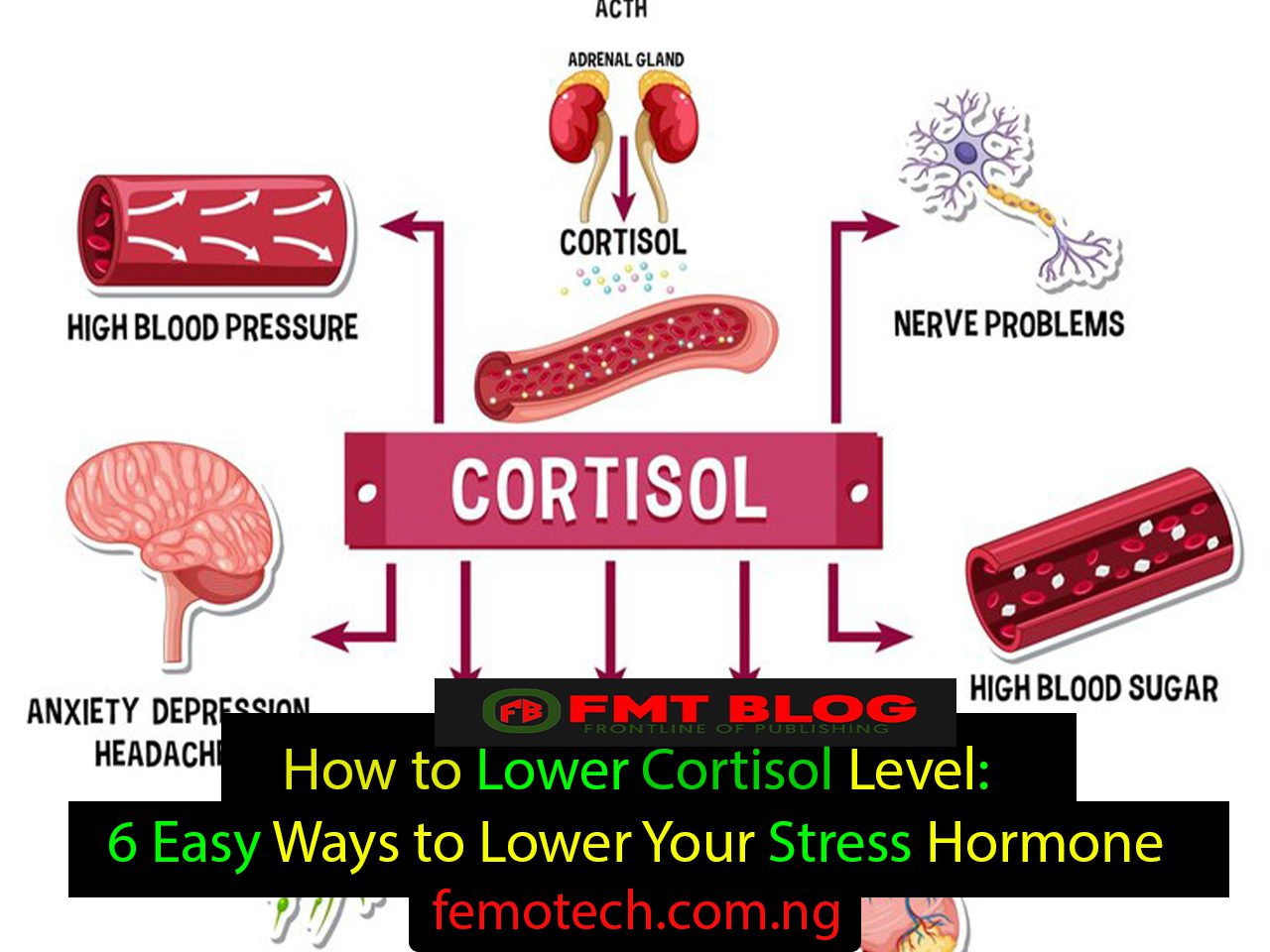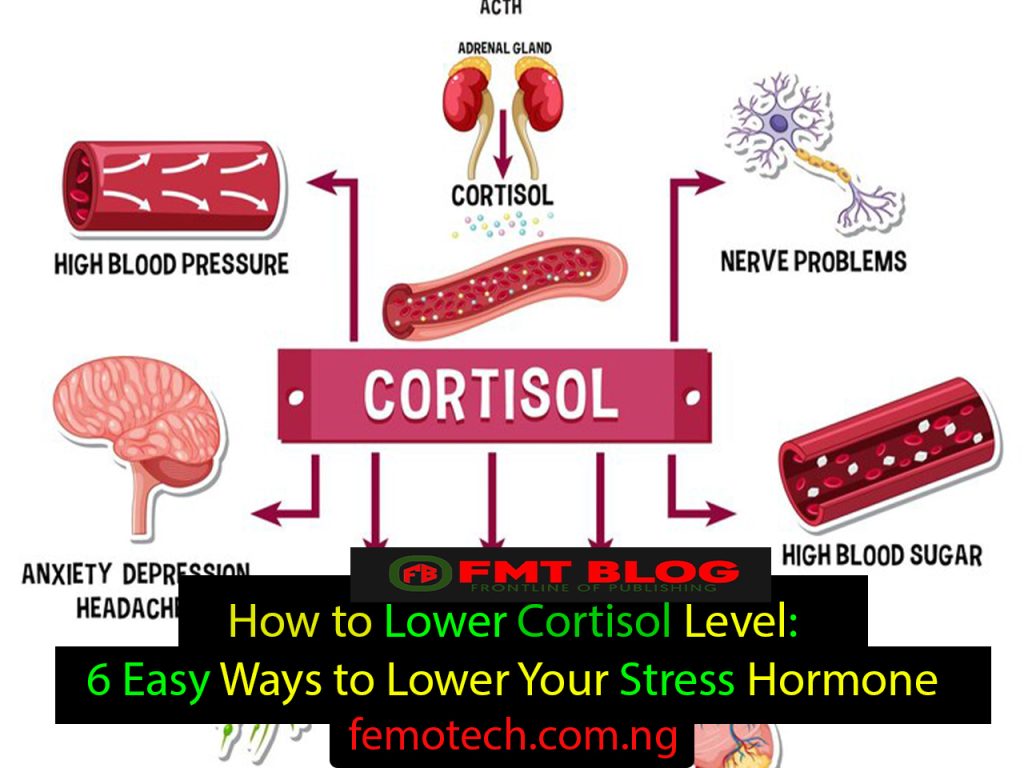
Feeling Stressed Out? It Might Be Your Cortisol! Learn 6 Easy Ways to Lower Cortisol Levels and Feel Better.

Introduction
I will say almost every adult has experienced this at least once: your chest feels tight, your stomach feels bad, and your never-ending list of things to do makes your brain feel like it’s being squeezed. Stress is part of life, but sometimes it feels like it’s taking over. How about if I tell you that there’s a secret reason for all that stress? A chemical known as cortisol.
What is cortisol?
Cortisol is like your body’s own special stress button. When you’re faced with a challenge, like a big presentation at work or a fight with a friend, cortisol gives you a boost of energy. It helps you deal with the situation but if you’re feeling stressed out all the time, your stress button can get stuck in the “on” position. This can be bad news for your health, because your body is constantly on high alert.
What Happens If I Have Too High Levels?
When the fire never seems to go out, chronically high cortisol levels can lead to a whole host of problems, including:
- Weight gain (especially around the belly)
- Difficulty sleeping
- Headaches
- Anxiety and depression
- A weakened immune system
- Increased blood pressure
- Difficulty concentrating
Is My Cortisol Levels Too High?
There’s no simple test you can do at home to check your cortisol levels. But there are some signs and symptoms to watch out for that might mean your cortisol levels are high. These include:
- Feeling constantly on edge or irritable
- Difficulty relaxing or falling asleep
- Weight gain, especially around the middle
- Constant fatigue despite getting enough sleep
- Frequent headaches
- Difficulty concentrating
6 Ways to Lower Cortisol Levels and Take Back Control
As a human, you have the power to calm your cortisol down and feel better. Here are some ways to do just that:
Reduce Stress
We all know stress is bad for us, but did you know it can also mess with your cortisol levels? Cortisol is like your body’s stress hormone, and when you’re feeling stressed all the time, your cortisol levels can stay high. This can make you feel even more stressed out, and it’s not a good cycle to be in. So, what can you do to manage stress? There are lots of things you can try, like relaxation techniques such as meditation, deep breathing exercises, or yoga. All of these can help you calm down and feel more relaxed, which will help to lower your cortisol levels.
Get Enough Sleep
When you don’t get enough sleep, your body goes into a bit of a stress mode. It starts pumping out cortisol to try to keep you awake and alert. Aim for 7-8 hours of quality sleep each night. This will help your body naturally regulate its cortisol levels and keep you feeling your best.
Frequent Exercise
Exercise is a great way to relieve stress and help regulate cortisol levels. The key here is to find an activity that you actually like to do. It doesn’t have to be anything super intense or time-consuming. Even a brisk walk around the block, a bike ride in the park, or dancing to your favorite music in your living room can all make a difference. When you’re moving your body and having fun, it helps to take your mind off of stress and lowers the amount of cortisol your body produces.
Eat a Balanced Diet
The food you eat has a big impact on how your body deals with stress. When you eat sugary or processed foods, your blood sugar levels spike and then crash. This can lead to feelings of fatigue, irritability, and cravings, all of which can contribute to stress. On the other hand, eating a balanced diet that includes plenty of fruits, vegetables, and whole grains helps to keep your blood sugar levels stable. This provides your body with the energy it needs to function properly and helps to prevent cortisol spikes. So, next time you’re feeling stressed, reach for a healthy snack instead of a sugary treat. Your body will thank you for it!
Limit Caffeinated Drinks and Alcohol
While that morning cup of coffee or tea might jumpstart your day, too much caffeine can actually make you feel more stressed and anxious in the long run. This is because caffeine can interfere with your sleep and keep your cortisol levels elevated. Alcohol, on the other hand, might seem like a way to unwind at the end of the day, but it disrupts your sleep quality and can make you feel more stressed out in the long run. So, it’s best to limit your intake of caffeinated drinks and alcohol to manage your stress levels and keep your cortisol in check.
Connect with loved ones
Spending time with the people who make you feel good is a great way to lower stress. These can be family members, friends, or even a pet. When you’re around people you care about and who care about you, your body feels safe and supported. This can help lower your cortisol levels and make you feel more relaxed and calmer. Try make time for the people who make you laugh and around whom you can be yourself.
Follow us on socials → Telegram | X/Twitter | Facebook | WhatsApp |WhatsApp Channel |Mobile App
Conclusion
Now that we have discussed how to lower cortisol levels and take back control, it is important to add these easy-to-do but powerful strategies to your everyday life. You can bring down your cortisol levels and feel calmer again.



